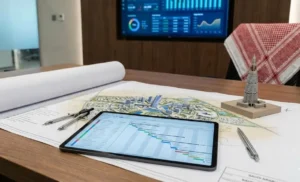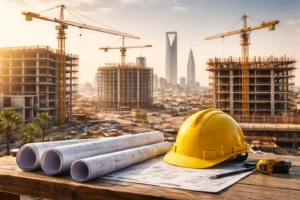Why Quality Assurance Matters in Saudi Construction
Why Quality Assurance Is Non-Negotiable in Saudi Arabia Construction
The booming construction landscape in Saudi Arabia is nothing short of extraordinary. The construction sector in Saudi Arabia is expected to grow strongly in the coming years, with the market size valued at around USD 97.8 billion in 2024 and forecast to reach USD 135.6 billion by 2033.
Amid this growth, ensuring high-quality delivery is no longer optional. In the Saudi Arabia construction market, quality assurance is non-negotiable. In this article we examine what quality assurance means, why it is critical specifically in Saudi Arabia construction, how it works in practice, what risks arise if it’s neglected, and what best practices stakeholders can follow.
What Is Quality Assurance in Construction?
In a construction context, quality assurance (QA) refers to the systematic activities and processes that ensure a construction project meets defined standards, specifications, regulatory requirements and client expectations before, during and after execution.
Quality assurance is related to but distinct from quality control (QC). QA is proactive: it sets up the frameworks, processes, checks, documentation and verification so that the construction process is capable of delivering high-quality output. QC is reactive: it inspects and corrects defects after or during construction.
In the Saudi Arabia construction market, the QA function must align with national standards, regulatory frameworks (including building codes), large-scale projects (so-called “giga-projects”), and increasingly international best practices.
Key Elements of QA in Construction
The following are core components:
-
Setting up a Quality Management System (QMS) with documented procedures, roles and responsibilities. For example, in Saudi Arabia a study developed a QMS framework specific to Saudi construction companies.
-
Design review and verification of drawings, specifications and contracts.
-
Inspection and testing of materials, components and workmanship.
-
Process audits, audits of subcontractors and suppliers.
-
Non-conformance reporting, corrective and preventive actions.
-
Continuous improvement and lessons-learned cycles.
-
Compliance with regulatory requirements and standards (e.g., the national building code). For example, the Saudi Standards, Metrology and Quality Organization (SASO) plays a central role in quality infrastructure in Saudi Arabia.
Why Quality Assurance Is Non-Negotiable in the Saudi Arabia Construction Market
Given the size, ambition and complexity of construction in Saudi Arabia, QA moves from “nice to have” to “must-have”. Here are the reasons:
1. Massive Scale and Ambitious Growth
The construction market in Saudi Arabia is growing rapidly thanks to large public infrastructure, commercial, residential and tourism-driven projects. For example: the Saudi Arabia construction market size was valued at USD 97.8 billion in 2024 and projected to grow significantly.
With growth on this scale, there is increased risk of cost overruns, schedule delays, performance failures, rework and reputational damage if quality assurance is weak.
2. Regulatory and Standards Landscape
Saudi Arabia has implemented new regulatory reforms. For instance, the “Standards and Quality Law” and “Product Safety Law” issued in 2024 will enhance quality regulation across sectors, including construction materials and components. The national building code and other requirements mean that construction projects must meet safety, sustainability, structural and performance standards. QA ensures compliance and avoids legal/regulatory risks.
3. Risk of Defects, Safety and Reputation
Quality assurance helps prevent structural defects, safety hazards, higher maintenance costs and reputational harm. As one article pointed out: “quality control in construction projects … is essential to check the poor construction quality … to mitigate safety hazards, structural defects, and higher maintenance costs.”
In the Saudi Arabia construction market, where major projects attract international attention, failing QA can lead to costly issues, delays, rework and loss of stakeholder confidence.
4. Efficiency, Cost Control and Delivery Time
QA contributes to more efficient project delivery by preventing problems rather than reacting to them. As a generic industry source notes: QA “can improve site safety, boost productivity, reduce costs and ensure compliance with regulations.”
In the Saudi Arabia construction environment — with tight timelines, high-value contracts and complex logistics — avoiding defects and rework is vital for cost containment and schedule fidelity.
5. Alignment with Vision 2030 and Sustainability
Saudi Arabia’s national transformation agenda, Saudi Vision 2030, emphasises high-quality infrastructure, innovation, sustainability and world-class delivery of construction assets. QA supports these goals by ensuring that construction meets quality, durability, sustainability and performance targets.
Conclusion
In the dynamic and rapidly growing Saudi Arabia construction market, quality assurance isn’t optional — it’s essential. From large-scale infrastructure and residential programmes to the latest off-site construction technologies, the stakes are high and the margin for error is low. By implementing rigorous QA systems, aligning with regulatory frameworks, building a culture of quality, and leveraging technology, construction firms operating in Saudi Arabia can deliver safe, high-performing, on-time and cost-effective assets.
As the construction market in Saudi Arabia continues to expand — driven by Vision 2030, public investment and private participation — those firms that prioritise QA will stand out. The message is clear: quality assurance in construction in Saudi Arabia is non-negotiable.



